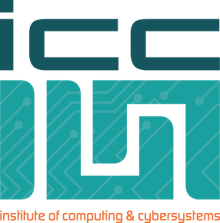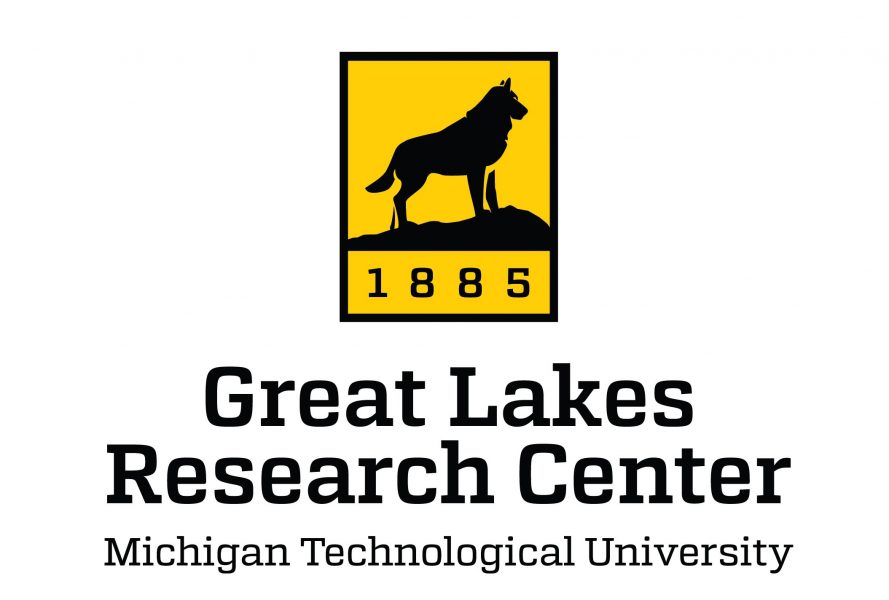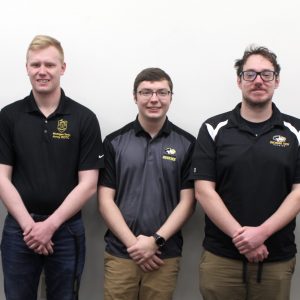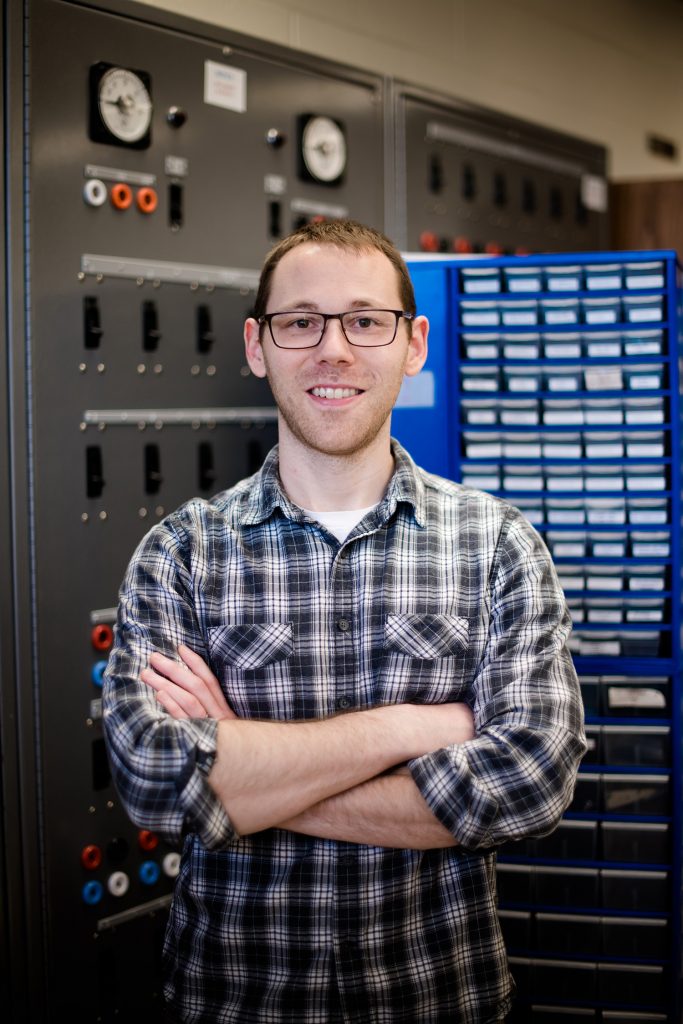
The Institute of Computing and Cybersystems (ICC) is pleased to welcome Tony Pinar as a member. Pinar’s primary research interests are in applied machine learning and data fusion.
A lecturer in Michigan Tech’s Electrical and Computer Engineering department, Pinar holds a Ph.D. and M.S. in Electrical Engineering from Michigan Tech. His previous positions include research engineer for Michigan Tech’s Advanced Power System Research Center and electrical design engineer for GE Aviation. He is a member of the Institute of Electrical and Electronics Engineers (IEEE) and the IEEE Computational Intelligence Society.
Pinar’s teaching interests include machine learning, signal processing, and electronic design. Included among the classes he teaches are Electronics, Electronic Applications, Probability—Signal Analysis, and Control Systems I.
“Teaching is like a puzzle where one may have to take a difficult concept, reduce it to digestible pieces, and deliver them to fresh minds in a way to maximize understanding and insight,” Pinar says. “That challenge is what drives me to be a better teacher.”
Pinar believes that to be a good teacher one must understand the topics very well and he strives for the most effective delivery. “This keeps me on my toes, forces me to constantly identify holes in my knowledge, and drives me to continuously strive to learn new things,” he explains.
On research, Pinar says it is rewarding to work on open-ended and novel problems that are in their infancy and at the cutting edge of today’s technology.
“It is also exciting to me to watch the cutting edge move forward, see what sticks and what doesn’t, and observe how the direction(s) of the field evolve,” he adds. “I’m very new to this domain so I haven’t been able to observe it for long, but I am looking forward to witnessing the future of the field.”

Dr. Timothy Havens, College of Computing, and Dr. Anthony Pinar, Electrical and Computer Engineering, have been awarded a two-year, $428,707 project by the SOSSEC Inc. / U.S. Army ERDC to investigate “Modeling and Algorithm Development for Adaptive Adversarial AI for Complex Autonomy.”
The project will study how autonomous systems operate in complex and unstructured environments, focusing on sensing, processing, and decision-making capabilities.
Havens and Pinar are members of the Institute of Computing and Cybersystem’s Center for Data Sciences.
Tim Havens is associate dean for research, College of Computing, the William and Gloria Jackson Associate Professor of Computer Systems, and director of the Institute of Computing and Cybersystems.
Tony Pinar is a lecturer and senior design coordinator in the Electrical and Computer Engineering department.
The SOSSEC Consortium was specifically formed to address the needs of the Department of Defense (DoD). It was founded on a simple concept: that collaboration, innovation, and cooperation among a broad spectrum of industry, academia and non-profit entities vastly improves the products and services delivered to its clients, according to the organization’s website.
The mission of the US Army Engineer Research and Development Center (ERDC), an integral component of the Office of the Assistant Secretary of Defense for Research and Engineering, is to help solve the nation’s most challenging problems in civil and military engineering, geospatial sciences, water resources, and environmental sciences for the benefit of the Army, the Department of Defense, civilian agencies, and the public good, according to the organizations’s website.

The Institute of Computing and Cyberersystems (ICC) promotes collaborative, cross-disciplinary research and learning experiences through six research centers in the areas of computing education, cyber-physical systems, cybersecurity, data sciences, human-centered computing, and scalable architectures and systems, for the benefit of Michigan Technological University and society at large.
The ICC’s 55 members represent more than 20 academic disciplines at Michigan Tech. Member scientists are collaborating to conduct impactful research, make valuable contributions in the field of computing, and solve problems of critical national importance.

ICC’s Center for Data Sciences (DataS) focuses on the research of data sciences education, algorithms, mathematics, and applications. DataS fosters interdisciplinary collaborations by bringing together diverse faculty and students from varied disciplines to discover new knowledge and exciting research opportunities in the field of data sciences.

Dr. Timothy Havens (ICC), Dr. Andrew Barnard (GLRC), Dr. Guy Meadows (GLRC), and Dr. Gowtham (IT/ECE) have been awarded an Office of Naval Research DURIP grant titled, “Acoustic Sensing System and High-Throughput Computing Environment and Threat Monitoring in Naval Environments Using Machine Learning.”
The $243,169 award will fund procurement of new high throughput computing and underwater acoustic sensing systems for use by researchers at Michigan Tech.
The Defense University Research Instrumentation Program (DURIP) supports universities through awards meant to build the infrastructures necessary for relevant, high-quality Navy research.
We believe that these resources will considerably multiply our capability and productivity in assisting the U.S. Navy, and DoD at large, to move forward on numerous fronts. We have excellent resources, but lack some infrastructure capabilities to make a leap in theory and applications.
Havens says that the award supports two active U.S. Navy projects in particular, “ONR Graduate Traineeship Award: Multi-Modal, Near-Shore, Ice-Covered Arctic Acoustic Propagation Measurements and Analysis (ONR #N00014-18-1-2592)” and “Localization, Tracking, and Classification of On-Ice and Underwater Noise Sources Using Machine Learning (US NSWC #N00174-19-1-0004).”
“With this new equipment we can begin to conduct more detailed, realistic, and repeatable sensor/target experiments, and facilitate expansion of current research into related areas of interest to the DoD, such as deep learning with digital phased arrays and persistent, distributed sensing with sensor arrays,” Havens notes.
“The equipment will significantly enhance Michigan Tech capabilities for six other Department of Defense (DoD)-funded projects as well, including NGA, SPAWAR, and DARPA awards,” he adds.
Finally, through graduate student participation in the research, and collaboration with the undergraduate SENSE Enterprise at Michigan Tech (Strategic Education through Naval Systems Experiences), the equipment will augment Navy STEM education and future workforce development.
Tim Havens is associate dean for research, College of Computing, the William and Gloria Jackson Associate Professor of Computer Systems, and director of the Institute of Computing and Cybersystems.
Andrew Barnard is director of the Great Lakes Research Center,
associate professor, Mechanical Engineering—Engineering Mechanic, and Faculty advisor to the undergraduate SENSE Enterprise.
Guy Meadows is director of the Marine Engineering Laboratory, the Robbins Professor of Sustainable Marine Engineering, and a research professor in the Department of Mechanical Engineering-Engineering Mechanics.
Gowtham is director of research computing for Michigan Tech’s Information Technology department; an adjunct assistant professor, Physics; a research associate professor, Electrical and Computer Engineering; and an NSF XSEDE Campus Champion.

The Institute of Computing and Cyberersystems (ICC) promotes collaborative, cross-disciplinary research and learning experiences through six research centers in the areas of computing education, cyber-physical systems, cybersecurity, data sciences, human-centered computing, and scalable architectures and systems, for the benefit of Michigan Technological University and society at large.
The ICC’s 55 members represent more than 20 academic disciplines at Michigan Tech. Member scientists are collaborating to conduct impactful research, make valuable contributions in the field of computing, and solve problems of critical national importance.

The Great Lakes Research Center (GLRC) provides state-of-the-art laboratories to support research on a broad array of topics. Faculty members from many departments across Michigan Technological University’s campus collaborate on interdisciplinary research, ranging from air–water interactions to biogeochemistry to food web relationships.
One of the GLRC’s most important functions is to educate the scientists, engineers, technologists, policymakers, and stakeholders of tomorrow about the Great Lakes basin. The Center for Science and Environmental Outreach provides K–12 student, teacher, and community education/outreach programs, taking advantage of the Center’s many teaching labs.
The GLRC also contains a lake-level marine facility and convenient deep-water docking, providing a year-round home for Michigan Tech’s surface and sub-surface fleet of marine vehicles.
An article by Anthony Pinar (DataS/ECE) and Timothy Havens (DataS/CC), in collaboration with University of Missouri researchers Muhammad Islam, Derek Anderson, Grant Scott, and Jim Keller, all of University of Missouri, has been published in the July 2020 issue of the journal IEEE Transactions on Fuzzy Systems.
The article is titled, “Enabling explainable fusion in deep learning with fuzzy integral neural networks.” Link to the article here.
Abstract:
Information fusion is an essential part of numerous engineering systems and biological functions, e.g., human cognition. Fusion occurs at many levels, ranging from the low-level combination of signals to the high-level aggregation of heterogeneous decision-making processes. While the last decade has witnessed an explosion of research in deep learning, fusion in neural networks has not observed the same revolution. Specifically, most neural fusion approaches are ad hoc, are not understood, are distributed versus localized, and/or explainability is low (if present at all). Herein, we prove that the fuzzy Choquet integral (ChI), a powerful nonlinear aggregation function, can be represented as a multilayer network, referred to hereafter as ChIMP.
We also put forth an improved ChIMP (iChIMP) that leads to a stochastic-gradient-descent-based optimization in light of the exponential number of ChI inequality constraints. An additional benefit of ChIMP/iChIMP is that it enables explainable artificial intelligence (XAI). Synthetic validation experiments are provided, and iChIMP is applied to the fusion of a set of heterogeneous architecture deep models in remote sensing. We show an improvement in model accuracy, and our previously established XAI indices shed light on the quality of our data, model, and its decisions.
Citation
M. Islam, D. T. Anderson, A. J. Pinar, T. C. Havens, G. Scott and J. M. Keller, “Enabling Explainable Fusion in Deep Learning With Fuzzy Integral Neural Networks,” in IEEE Transactions on Fuzzy Systems, vol. 28, no. 7, pp. 1291-1300, July 2020, doi: 10.1109/TFUZZ.2019.2917124.

A team of five Michigan Tech students received Honorable Mention honors in the second annual SICK Inc. TiM$10K Challenge, a national innovation and design competition. University students from around the country participated in the event designed to support innovation and student achievement in automation and technology.
The Michigan Tech team members — Brian Parvin (ME), Paul Allen (EE), David Brushaber (CompEng), Kurtis Alessi (CompEng) and Alex Kirchner (CompEng) — earned Honorable Mention (fourth place overall) for their project, “Evaluating Road Markings (the Road Stripe Evaluator). Their project was sponsored by SICK Inc. Watch a video about the project below.
Adrienne Minerick, dean of Michigan Tech’s College of Computing, said in a June 1, 20920, Tech Today article that the accomplishments of these outstanding students illustrates Michigan Tech’s creativity and tenacity when faced with a challenge. “Our rapidly growing presence in cybersecurity is built upon our students deep knowledge of the fundamentals combined with the learning environment that promotes agility to meet (and exceed) any challenge. These hardworking and bright students deserve this recognition of their competitiveness. All of us in the College of Computing are proud.”
For the competition, teams were supplied with a 270-degree SICK LiDAR sensor and accessories, and challenged to solve a problem, create a solution, or bring a new application to any industry that utilizes the SICK LiDAR.
Each team submitted a video and paper for judging upon completion of its project. A panel of judges decided the winning submissions based on creativity and innovation, ability to solve a customer problem, commercial potential, entrepreneurship of the team, and reporting.
The Tech team developed an innovative product to help resolve issues caused by poor road markings, while reducing maintenance costs and improving motorist safety. Their new software uses reflectivity values obtained using a SICK LiDAR unit to identify deterioration of road stripes and recommend timely repainting, also aiding in the safety and reliability of self-driving vehicles on roadways.
They constructed a prototype to demonstrate functionality, in the form of a pushable cart that evaluates road markings. An intuitive user interface displays the markings being evaluated, and indicates if they meet necessary levels of reflectivity.
Pinar said the team was well organized and demonstrated an excellent work ethic from day one. “It was exciting to watch them identify a salient problem and develop a functional proof-of-concept solution despite the setbacks that affected us all after spring break,” he said.
“This was a unique project in that the team was required to identify a problem and develop a solution to it that is based on SICK’s TiM LiDAR, while most teams are handed a problem and asked to create a solution,” Pinar noted. “I think this format allowed the team to exercise even more innovation than on a ‘typical’ project.”
The same team of students was awarded Honorable Mention honors at this spring’s Design Expo Senior Design competition for their project, “Road Marking Reflectivity Evaluator.”

SICK, Inc. is one of the world’s leading manufacturers of sensors, safety systems, machine vision, encoders and automatic identification products for industrial applications.


